Overview
The 2025 Salary Guide for HR Managers presents critical insights into compensation trends that are reshaping the landscape of recruitment. It underscores the necessity for competitive pay and highlights the significance of in-demand skills, alongside the impact of geographical salary variations.
HR managers must align their compensation strategies with these trends to effectively attract and retain top talent in a rapidly evolving job market. Notably, data reveals significant salary differences across regions, coupled with an increasing demand for skills such as data analysis and AI proficiency.
How can HR managers leverage this information to enhance their recruitment strategies?
Key Highlights:
- Boutique Recruiting specializes in personalized recruitment services across various industries, providing insights into compensation expectations.
- The 2025 salary guide predicts a focus on efficiency, transparency, and candidate experience, with 93% of companies expected to invest in recruitment technology.
- Data Scientists and Healthcare Managers are projected to earn the highest salaries in 2025, with Data Scientists earning between $120,000 and $150,000.
- HR managers must align compensation packages with the 2025 salary guide to attract and retain top talent amid evolving job market dynamics.
- Demand for skills like data analysis, AI proficiency, and project management is increasing, with 74% of executives prioritizing proven expertise over formal degrees.
- Compensation trends indicate a shift towards performance-based pay and improved transparency in wage structures, with 64% of businesses adopting systematic performance management.
- Geographical salary variations are significant, with cities like San Francisco and New York offering salaries 20-30% above national averages.
- Employee benefits trends for 2025 emphasize mental health support, flexible work arrangements, and comprehensive wellness programs.
- Economic factors, including inflation and unemployment rates, are crucial in shaping salary expectations and compensation strategies.
- Technology’s rise is transforming wage trends, with roles requiring advanced tech skills seeing pay increases, while those vulnerable to automation face stagnation.
Introduction
As the job market evolves, the significance of competitive compensation and personalized recruitment strategies becomes increasingly clear. The 2025 Salary Guide offers invaluable insights for HR managers, highlighting the urgent need to align salary expectations with industry standards and candidate qualifications.
With key sectors like technology and healthcare leading the way in salary offerings, understanding these trends is crucial for attracting and retaining top talent. The guide not only sheds light on geographical salary variations but also emphasizes the importance of in-demand skills, employee well-being, and flexible compensation models.
As organizations navigate the complexities of recruitment, leveraging the insights from this guide can empower HR professionals to make informed decisions that foster a motivated and engaged workforce.
Boutique Recruiting: Tailored Recruitment Solutions for Salary Insights
Boutique Recruiting excels in connecting high-quality candidates with employers across various industries, including finance, marketing, operations, and technology, through a personalized service model. This customized method enables HR managers to obtain essential insights into compensation expectations that align with industry standards and candidate qualifications. By deeply understanding the unique needs of both employers and candidates, Boutique Recruiting delivers data-driven insights that empower organizations to make informed compensation decisions.
The 2025 salary guide indicates that in 2025, the recruitment landscape is increasingly defined by efficiency, transparency, and candidate experience, with a staggering 93% of companies expected to invest in recruitment technology. This shift underscores the significance of personalized recruitment services in aligning compensation expectations with market trends. As Sir Richard Branson wisely stated, “Train people well enough so they can leave. Treat them well enough so they don’t want to.” This sentiment emphasizes the importance of fostering employee relationships, which is vital for effective compensation insights.
Furthermore, Dr. Veldsman’s case study, “Unlocking Individual Potential,” emphasizes the transformative role of HR professionals in cultivating environments that nurture individual potential. This directly impacts compensation insights and organizational success, reinforcing the necessity for personalized recruitment services.
With over 1,000 vendors offering customized HR software solutions, HR professionals face an abundance of choices to navigate the complexities of compensation expectations. Boutique Recruiting’s commitment to tailored recruitment solutions, exemplified by team members like Amanda, ensures they can confidently attract and retain top talent in a competitive job market, fostering meaningful connections that lead to client success. The insights from the comprehensive compensation guides for 2023, 2024, and the 2025 salary guide further enhance this understanding, providing HR managers with the necessary tools to make informed remuneration decisions.
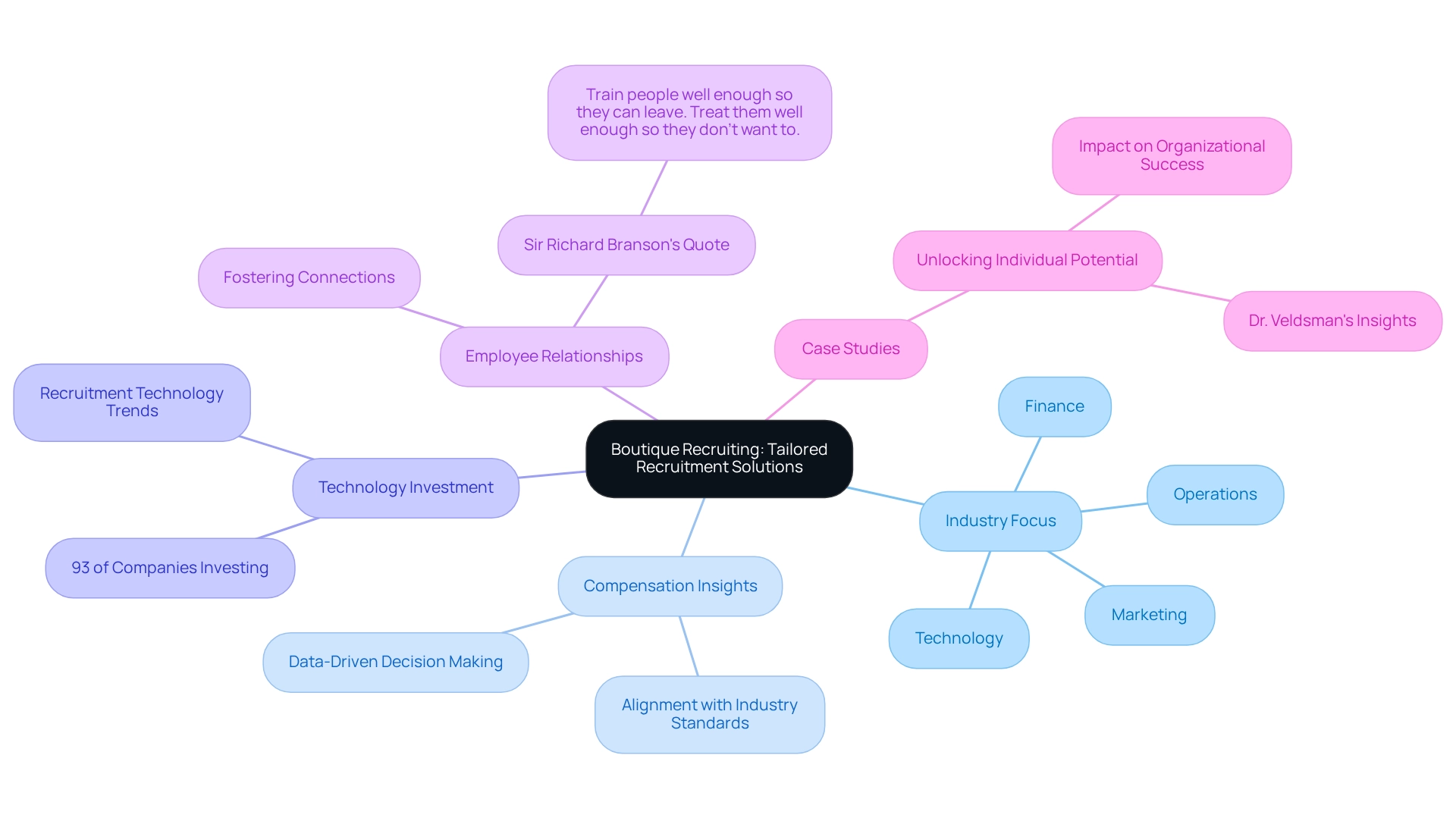
Top Salaries in 2025: Key Findings from the Salary Guide
According to the 2025 salary guide, the technology and healthcare sectors will provide the highest earnings, with Data Scientists and Healthcare Managers leading the way. Data Scientists can expect earnings between $120,000 and $150,000, driven by the increasing demand for skilled professionals in this field. Healthcare Managers are also anticipated to receive competitive compensation, reflecting the essential role they play in effectively overseeing healthcare operations.
HR managers at financial firms should consider these compensation projections when creating packages to attract and retain top talent throughout California. As the job market evolves, aligning compensation offerings with the 2025 salary guide is essential for attracting the best candidates. Boutique Recruiting, with regional offices in San Diego, Orange County, and Los Angeles, provides comprehensive compensation guides, including the 2025 salary guide, that offer valuable insights to help HR professionals navigate these challenges effectively. Furthermore, insights from industry leaders emphasize that while technical expertise is crucial, adaptability and a focus on proven outcomes will be key in making strategic hiring decisions in 2025. John Rosenbaum, Chief Information Officer, mentions that maneuvering through the tech sector will demand ongoing education and the capacity to adjust to the changing environment of AI and digital transformation.
As the recruitment landscape increasingly shifts towards skills-focused hiring, candidates are urged to emphasize their practical competencies and contributions, which will further influence compensation expectations. Notably, a PhD is not essential for high earnings in data science; experience and technical abilities hold greater significance. Additionally, the impact of inflation on salary projections must be considered, as adjusting salary forecasts helps maintain alignment with economic conditions, providing a more accurate outlook for job seekers. Companies that prioritize competitive compensation will not only attract high-caliber talent but also foster a motivated workforce capable of navigating the complexities of the modern job landscape.
Moreover, trends such as the return to the office for tech workers continue to influence the hiring landscape, making it crucial for HR professionals to remain informed and adaptable. In this war for talent, ensuring a seamless interview process is critical to avoid losing out on top candidates.
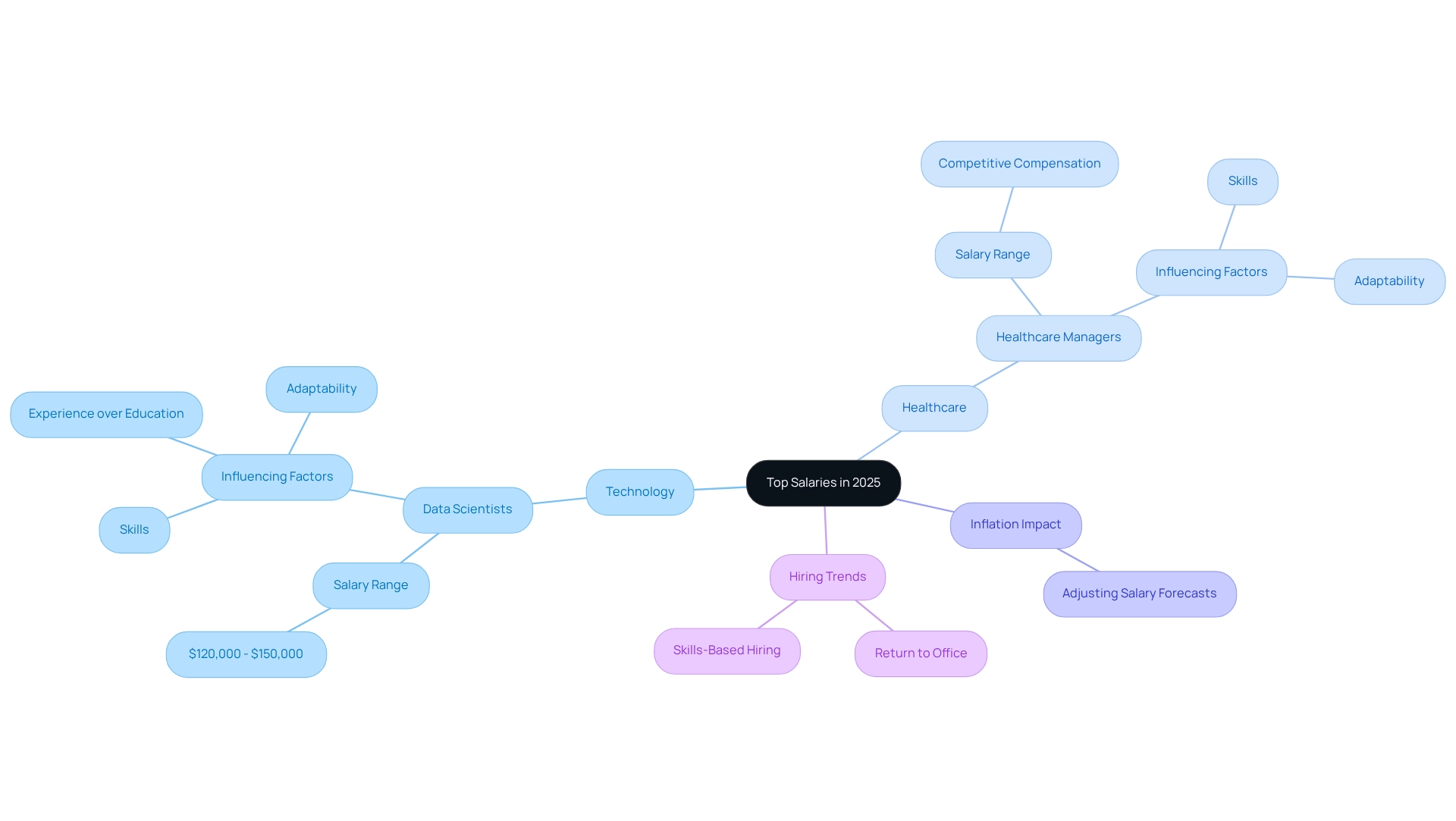
In-Demand Skills for 2025: Insights from the Salary Guide
The 2025 salary guide emphasizes essential skills that are becoming more sought after, particularly data analysis, AI proficiency, and project management. As organizations strive to maintain their competitive edge, employers in the financial sector must prioritize candidates adept at navigating complex data environments and leveraging technology to enhance business outcomes. The anticipated skill gaps in industries such as healthcare, manufacturing, and construction highlight the urgent need for HR professionals in finance to recalibrate their hiring strategies.
A significant trend is emerging in hiring practices: 74% of executives now prioritize proven expertise over formal degrees when selecting freelancers. This shift reflects a broader acknowledgment that demonstrated capabilities are essential for sustaining competitiveness in the market. As Anita Nielsen from LDK Advisory Services aptly states, “The reality is that being unprepared is a choice. The benefits come when we see AI as a tool, not a terror, and bring it into our sales motions.”
In 2025, HR professionals should utilize the 2025 salary guide to focus on candidates possessing strong data analysis and AI skills, as these are vital for driving organizational success. By aligning recruitment efforts with these in-demand skills, businesses position themselves to thrive in an evolving job landscape. Moreover, both business and government play crucial roles in fostering shared prosperity through technology, underscoring the significance of these skills in cultivating a competitive workforce.
As the landscape continues to evolve, are you prepared to adapt your hiring strategies? The time to act is now. Reach out for consultation and ensure your organization is equipped with the talent necessary to succeed.
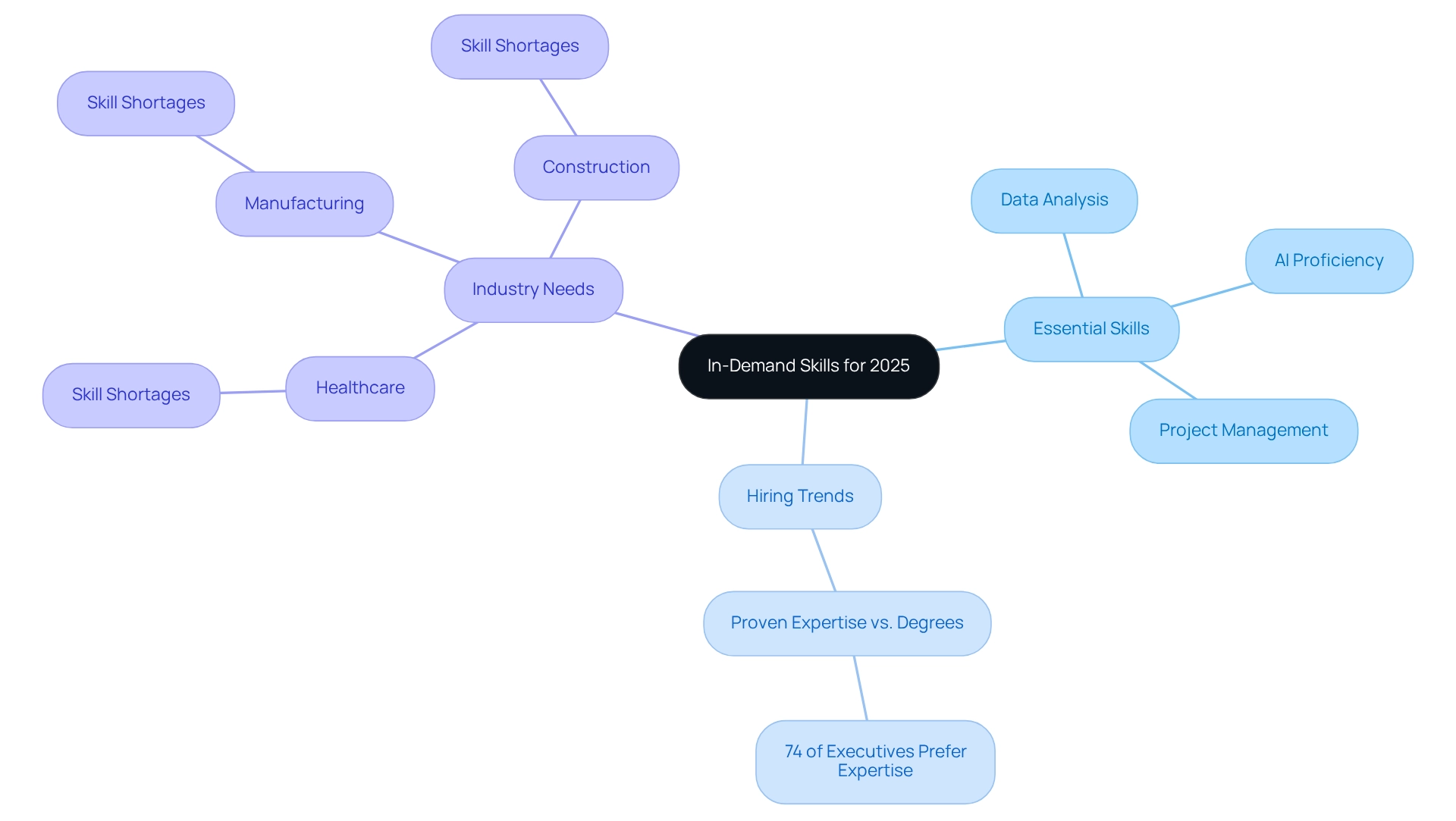
Compensation Trends for 2025: What HR Managers Should Know
The 2025 salary guide shows that remuneration trends in 2025 are increasingly leaning towards performance-based pay and improved transparency in wage structures. A significant 64% of businesses now employ a systematic approach to performance management, crucial for monitoring progress and ensuring that high performers are recognized and rewarded appropriately. HR managers must prioritize these trends when creating remuneration packages, as they not only promote a culture of performance and accountability but also enhance staff engagement and satisfaction.
The shift towards flexible pay models allows organizations to tailor remuneration strategies that align with individual performance while maintaining equity across teams. This approach incentivizes high achievers and cultivates a more inclusive workplace environment. Firms that establish open salary frameworks are experiencing beneficial results; clarity can improve trust and teamwork among staff.
Expert opinions indicate that as companies address these trends, they must balance the necessity for efficiency with the effectiveness of their pay strategies. Industry leaders emphasize that addressing employees’ core needs—such as recognition and involvement in company decisions—can significantly impact retention and motivation. Zig Ziglar noted that research indicates workers have three prime needs:
- Interesting work
- Recognition for doing a good job
- Being let in on things that are going on in the company
By embracing these compensation trends highlighted in the 2025 salary guide, HR managers can position their organizations for success in a competitive job market.
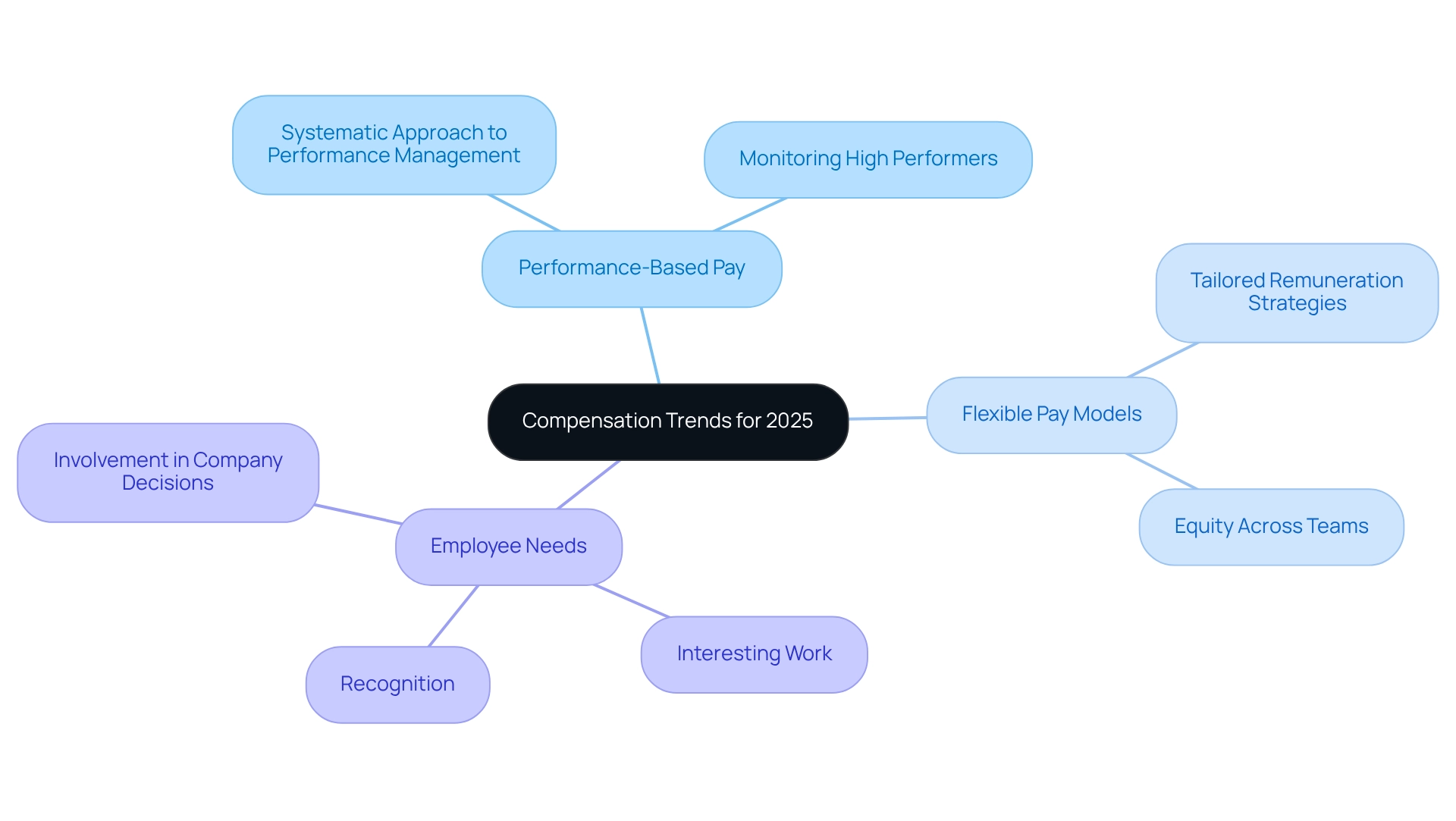
Industry-Specific Salary Benchmarks for 2025: A Guide for HR Managers
The 2025 salary guide from Boutique Recruiting provides extensive pay benchmarks tailored for key sectors, particularly finance and technology within California. In the finance sector, professionals can anticipate average earnings ranging from $90,000 to $120,000, underscoring the competitive environment for skilled talent. Similarly, technology positions are expected to offer compensation closely aligned with finance, driven by the increasing reliance on tech solutions across all sectors.
This trend emphasizes the necessity of personalized recruitment strategies to attract top talent in these high-demand fields, and HR professionals in San Diego, Orange County, and Los Angeles are encouraged to utilize the 2025 salary guide from Boutique Recruiting’s Employer and Candidate Salary Guides during negotiations. This ensures their remuneration packages remain appealing and competitive in the current market. By understanding these pay scales, HR professionals can make informed decisions that not only attract top talent but also retain valuable employees in a challenging job market.
Moreover, it is essential for HR professionals to consider comprehensive remuneration packages beyond mere salary. Most companies provide 5-7 sick days annually and 8-10 paid holidays, significantly enhancing the attractiveness of a compensation package.
Furthermore, insights from Boutique Recruiting’s detailed compensation guides highlight the importance for HR professionals to comprehend compliance issues that may also impact recruitment in finance and technology sectors. By integrating these elements, HR managers can navigate the complexities of compensation negotiations more effectively, ensuring their organizations remain competitive in attracting and retaining top talent.
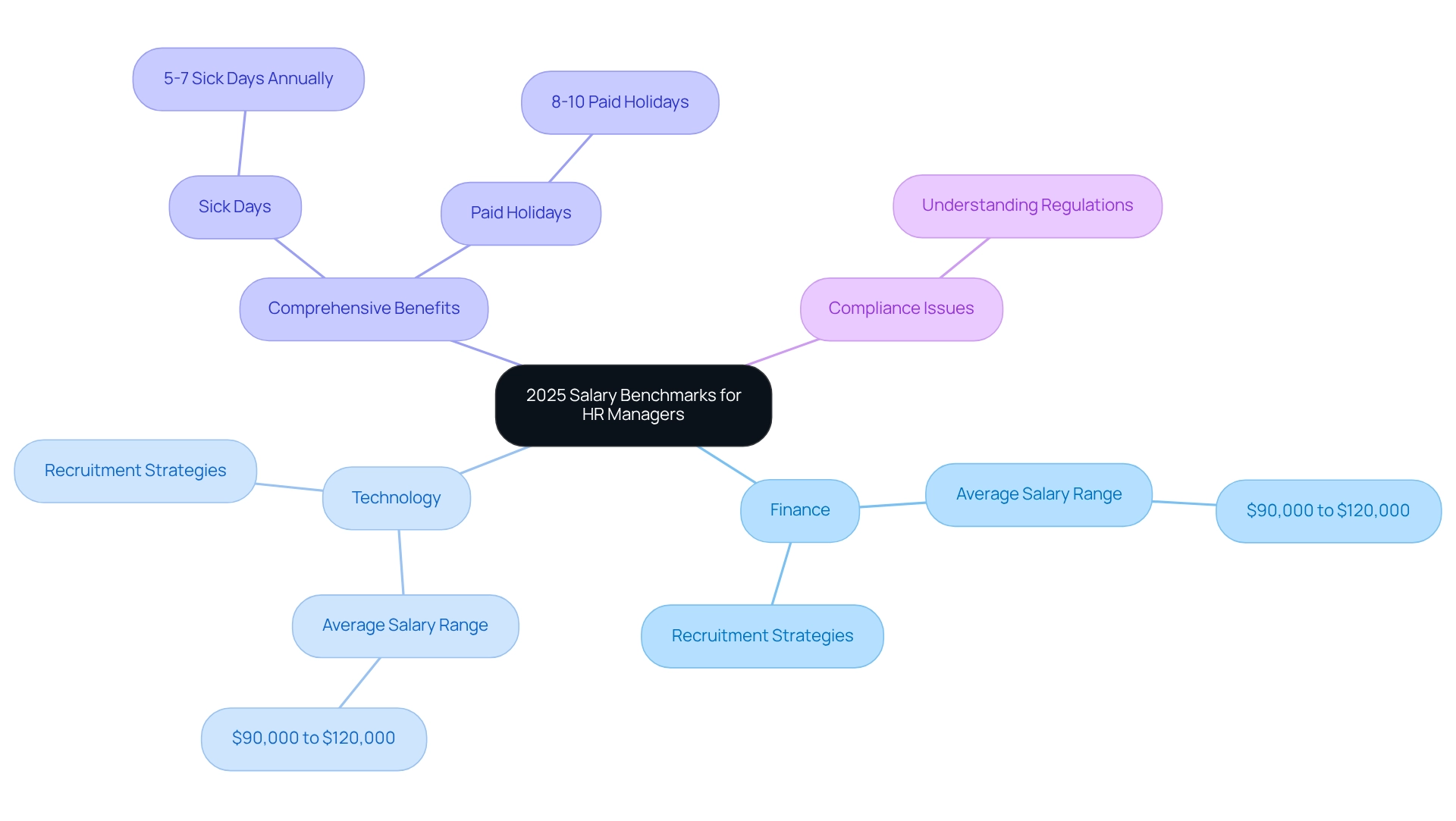
Geographical Salary Variations in 2025: Implications for Recruitment
The 2025 salary guide reveals striking disparities in geographical compensation variations, particularly between metropolitan areas and smaller markets. According to the 2025 salary guide, cities such as San Francisco and New York are expected to provide compensation that surpasses national averages by 20-30%. For instance, a software engineer in San Francisco can demand compensation exceeding $150,000, whereas the identical position in smaller markets might only generate about $100,000. This stark contrast necessitates that HR managers carefully evaluate these variations when crafting recruitment strategies and compensation offers, particularly with insights from the 2025 salary guide, which shows that the average CGPI for Pay Zone 5 is 88.3% of the national average, providing a benchmark for understanding these compensation differences. To remain competitive in attracting top talent, companies are increasingly adapting their compensation packages based on location, as suggested by the 2025 salary guide. Expert insights indicate that comprehending these geographical compensation dynamics is crucial for effective hiring, as neglecting to consider local market conditions can hinder recruitment efforts.
Moreover, candidates should be encouraged to explore multiple job offers. Is the first option always the best fit? Taking the time to assess how well these opportunities align with their long-term career goals and values can prevent hasty decisions that lead to regret. A company that values its employees will support candidates in making well-informed career choices.
Case studies demonstrate how organizations that align their compensation structures with regional expectations not only enhance their appeal to candidates but also improve retention rates, ultimately fostering a more engaged workforce. Boutique Recruiting’s commitment to quality in its recruitment process exemplifies how a focus on finding the right fit can be a strategic advantage in navigating these geographical salary variations. Furthermore, the recent HR Impact Survey encourages professionals to reflect on their decisions and adapt to the evolving market conditions.
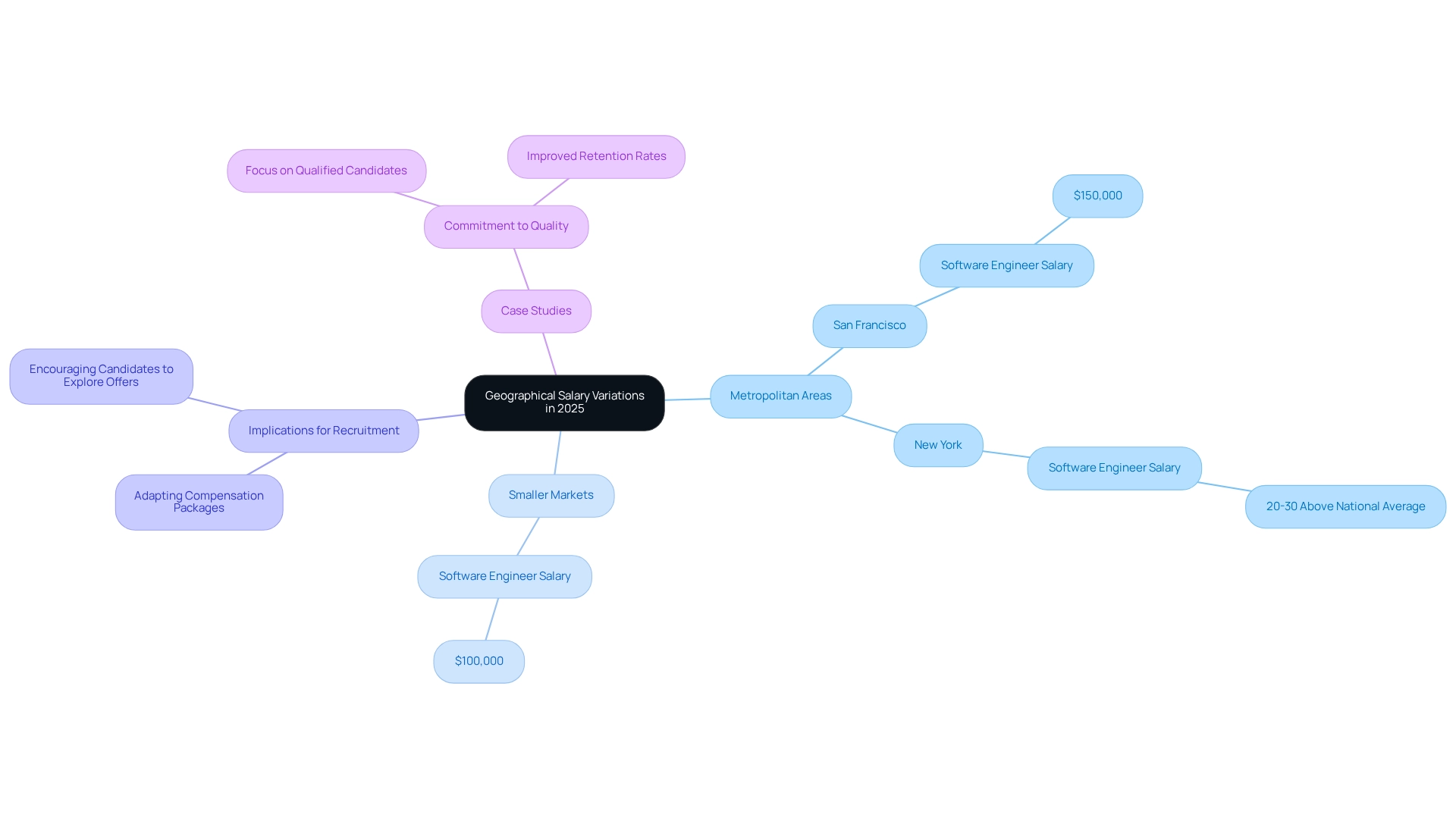
Employee Benefits Trends for 2025: Enhancing Compensation Packages
According to the 2025 salary guide, in 2025, worker benefits trends are increasingly focused on mental health support, flexible work arrangements, and comprehensive wellness programs. Organizations are recognizing the importance of catering to staff well-being by introducing initiatives such as mental health days and wellness stipends. Significantly, 88% of staff indicate that their benefits greatly enhance their overall sense of well-being, emphasizing the importance for HR managers to prioritize these offerings.
Moreover, a staggering 49% of employers currently do not provide flexible or personalized options, which can lead to a decline in motivation. This gap presents a critical opportunity for HR leaders to improve their remuneration packages. By integrating mental health support and flexible work arrangements, companies can not only attract but also retain top talent in a competitive job market. The expense of introducing new advantages can begin at approximately £4 monthly per staff member, rendering it a practical investment for numerous organizations, particularly in light of the expert views that highlight the significance of mental health assistance within staff benefits as outlined in the 2025 salary guide.
As organizations adjust to the changing environment, those that improve their compensation packages with wellness initiatives will likely observe increased staff satisfaction and productivity. For example, organizations that have effectively adopted wellness initiatives report higher engagement levels and decreased turnover rates, showcasing the concrete advantages of investing in staff well-being. To start applying these trends, HR managers should evaluate their existing benefits offerings and think about introducing flexible options and mental health resources to better address the needs of staff.
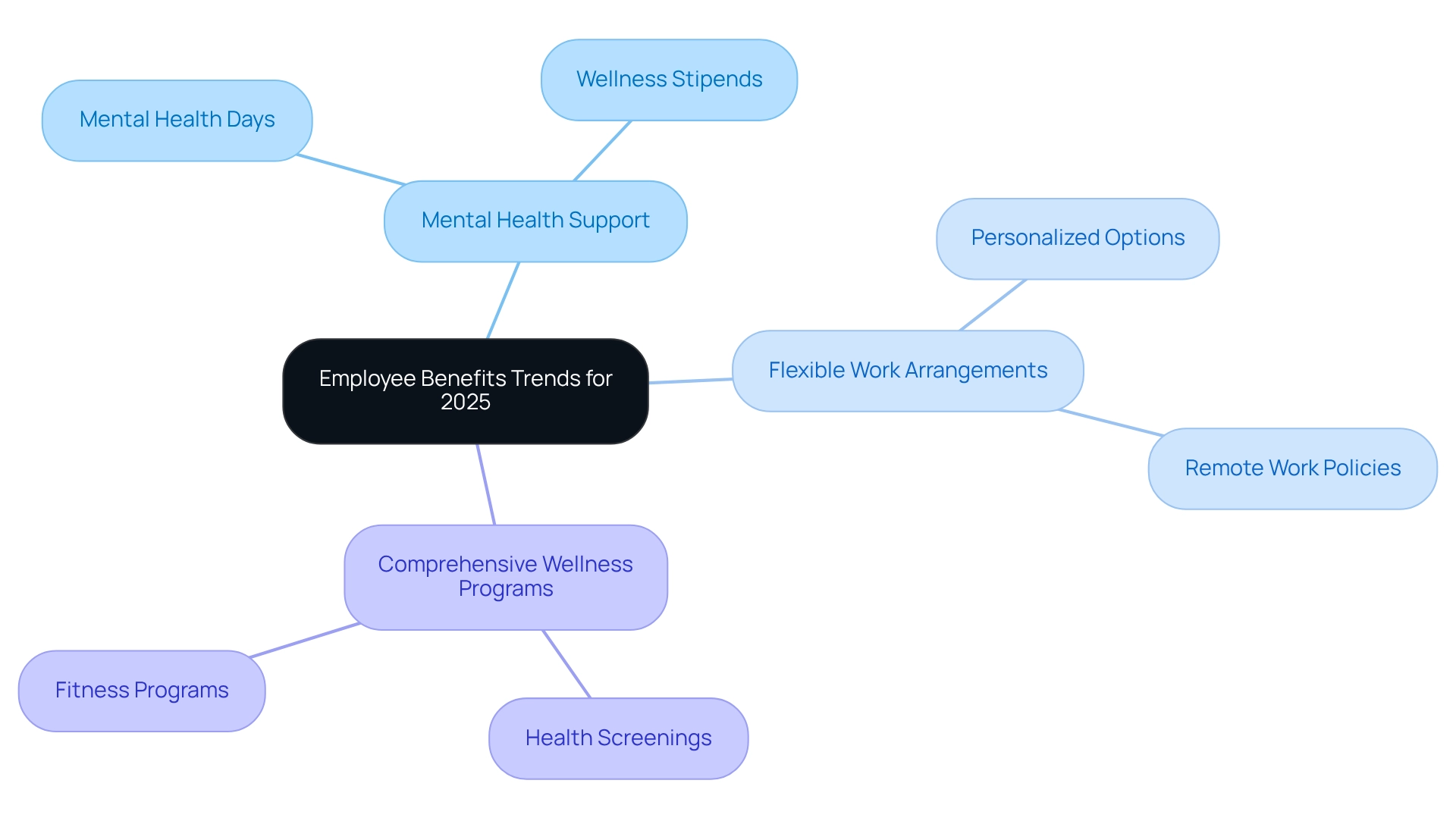
Economic Factors Influencing Salary Expectations in 2025
Economic factors such as inflation, unemployment rates, and industry growth projections are significantly influencing the compensation expectations outlined in the 2025 salary guide. With inflation rates expected to stabilize around 3%, employers are compelled to modify compensation to maintain employees’ purchasing power. This adjustment is crucial, especially in a competitive job market where attracting and retaining talent is paramount. As Warren Buffett aptly noted, “The arithmetic makes it plain that inflation is a far more devastating tax than anything that has been enacted by our legislatures,” highlighting the urgency for companies to respond to inflationary pressures.
Unemployment rates are also a crucial factor; as they vary, they directly impact wage negotiations and expectations. A lower unemployment rate generally results in heightened competition for talented individuals, encouraging companies to improve their salary offerings. HR managers must stay alert to these economic indicators to make informed, data-driven choices regarding compensation adjustments and recruitment strategies. Grasping the wider economic environment will allow companies to align their remuneration practices with market trends, ensuring they stay competitive in attracting top-tier talent.
Moreover, companies are increasingly adopting innovative salary strategies in response to inflationary pressures. For instance, some organizations are implementing flexible compensation models that include performance-based bonuses and benefits customized to staff needs. These approaches not only address immediate financial concerns but also foster long-term employee satisfaction and loyalty. Boutique Recruiting specializes in tailored recruitment solutions for niche legal positions, such as General Counsel and Legal Assistant, as well as high-demand finance roles like CFO and Financial Manager. This illustrates how personalized recruitment strategies can help businesses navigate these complexities effectively.
As the economic landscape continues to change, keeping informed about these factors will be crucial for HR managers seeking to manage the intricacies of compensation expectations as detailed in the 2025 salary guide. Furthermore, comprehending strategies such as exchange rate management can offer additional insights into how economic policies influence compensation expectations, making it essential for HR professionals to take these dynamics into account in their planning.
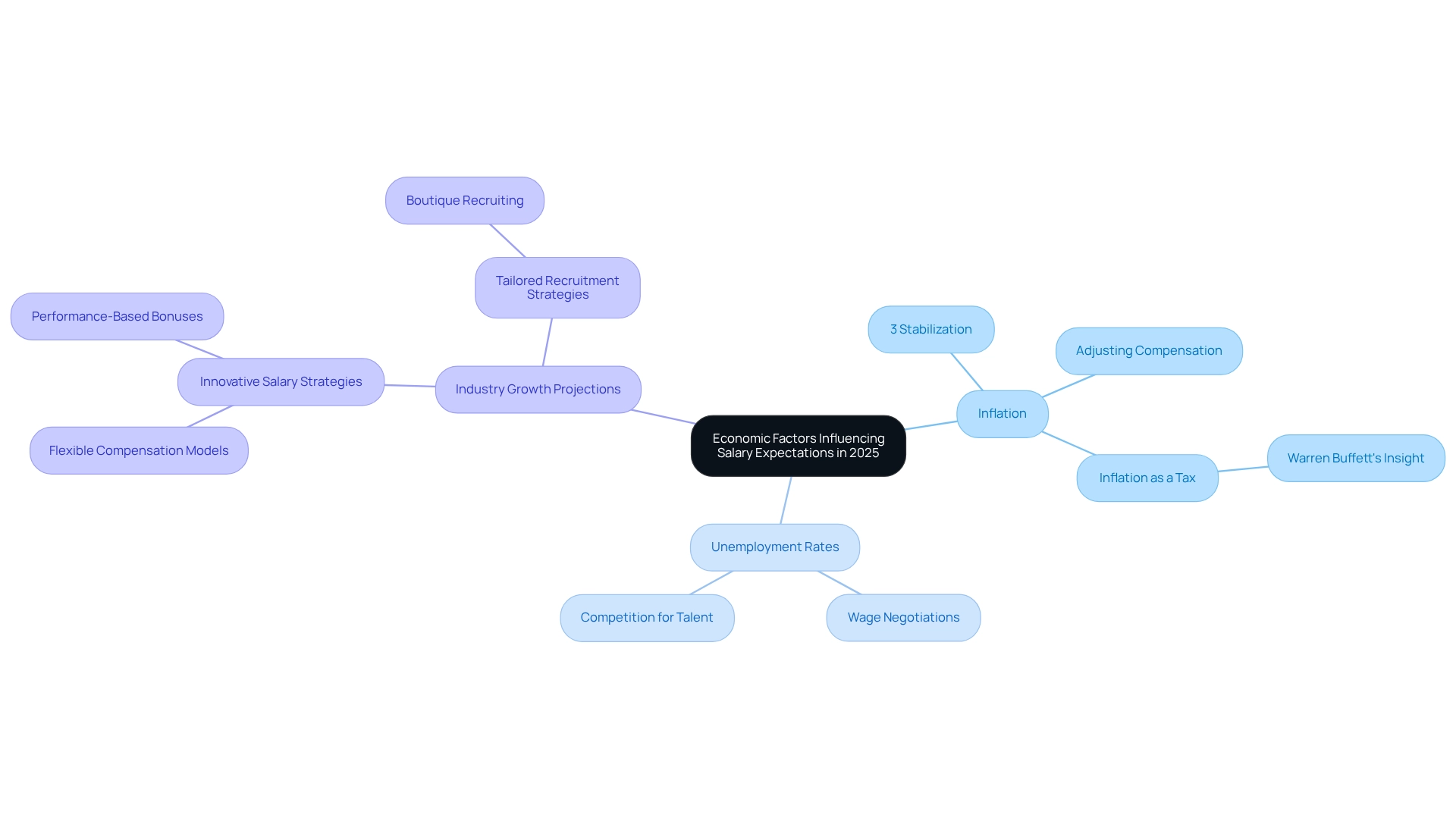
Technology’s Impact on Salary Trends for 2025: Insights for HR Managers
The rise of technology, particularly AI and automation, is significantly transforming wage trends according to the 2025 salary guide. Roles requiring advanced tech abilities are experiencing substantial pay hikes, reflecting the increasing demand for expertise in these fields. Companies are prioritizing upskilling and cross-skilling their existing workforce, with 48% of tech organizations adopting this strategy over hiring new talent. This shift not only enhances employee capabilities but also aligns compensation with the evolving market demands for tech-savvy professionals.
Conversely, roles vulnerable to automation, such as Systems Administrators and Help Desk Technicians, are facing wage stagnation or even reductions. Recent data indicates that Help Desk Technician salaries have decreased following a previous increase, likely due to the impact of AI automation on these functions and a shift in workforce demand. This trend underscores the necessity for HR professionals to reevaluate their salary strategies and invest in training programs that equip employees with the skills essential for excelling in a technology-driven environment.
Industry leaders are responding to these changes by adjusting their compensation packages. For instance, 45% of technology leaders have opted to increase pay to attract top candidates, showcasing the competitive nature of the job market for skilled professionals. As Alison Roller notes, “technology leaders are taking measures to attract top candidates, including increasing pay.” Furthermore, early-career individuals are encouraged to build a robust foundation of both technical and soft skills. HR professionals should facilitate mentorship opportunities and promote involvement in open-source projects to foster rapid career growth.
In summary, the interplay between technology and wage trends highlighted in the 2025 salary guide necessitates a proactive strategy from HR professionals. By focusing on Boutique Recruiting’s custom recruitment solutions for roles such as Chief Technology Officer, Engineer, and Systems Administrator, and aligning compensation with the demand for advanced tech skills, organizations can position themselves competitively in the evolving job market. Contact Boutique Recruiting to learn more about our unique searches tailored to your company’s needs.
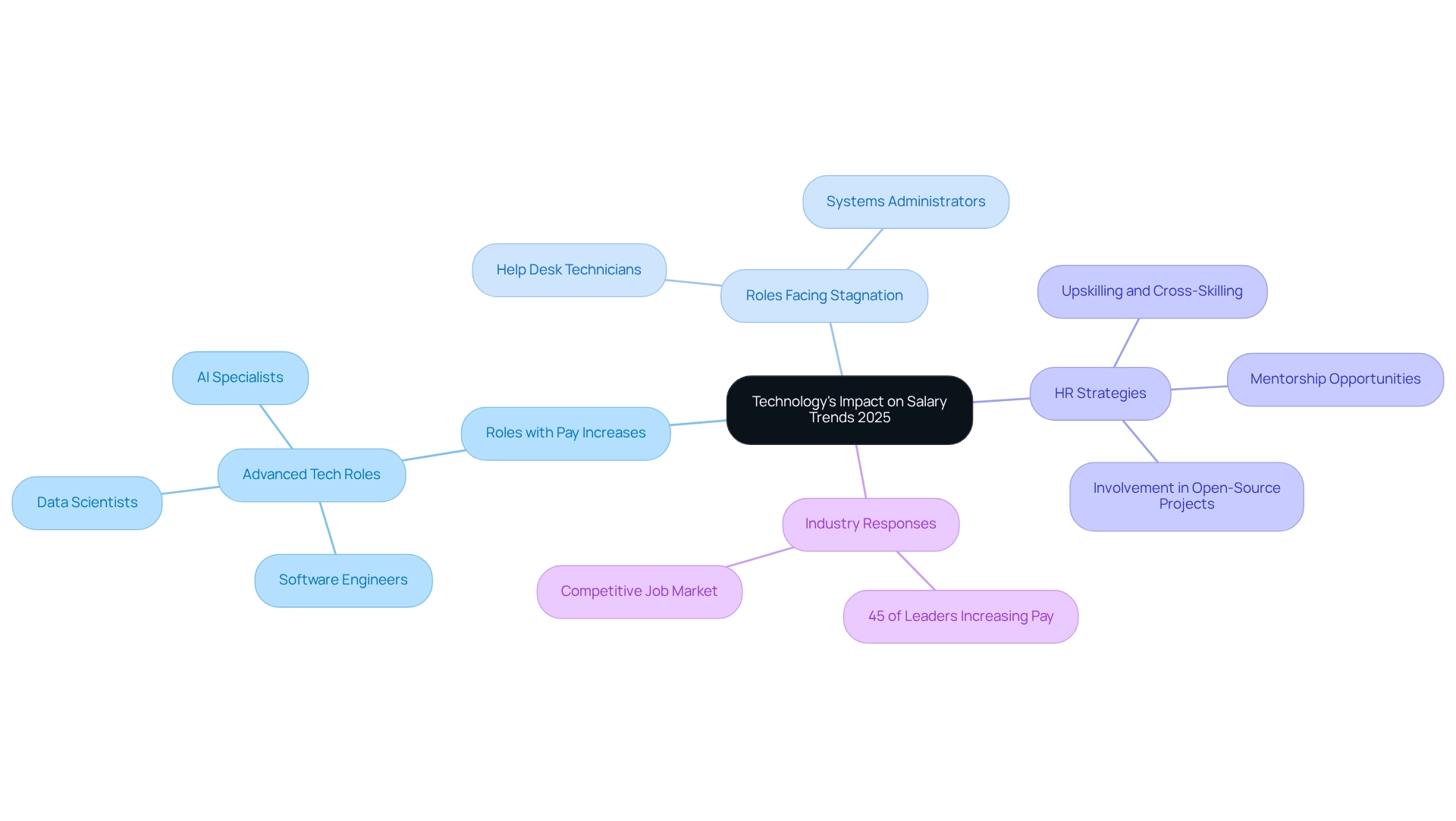
Implications of the 2025 Salary Guide for HR Managers: A Summary
The 2025 salary guide offers vital insights for HR professionals, underscoring the critical role of competitive pay and the necessity for in-demand skills in recruitment strategies. As organizations strive to attract and retain top talent, understanding geographical salary variations becomes increasingly paramount. Notably, improved salary and benefits are among the primary factors influencing workers’ job selections, emphasizing the need for HR leaders to remain competitive in their remuneration offerings.
In 2025, the demand for knowledge in staff well-being is anticipated to rise, regardless of budget limitations in certain industries. This trend highlights the importance of a holistic approach to benefits, which not only addresses diverse workforce needs but also supports a broader total rewards strategy. The recent increase in menstrual leave benefits by 0.4% from the previous year illustrates a growing recognition of the necessity for inclusive workplace policies that prioritize staff well-being, and leveraging insights from the 2025 salary guide allows HR professionals to refine their recruitment strategies effectively. By aligning remuneration packages with market trends, organizations can better position themselves to attract candidates with the skills that are in high demand. Furthermore, expert insights indicate that a focus on company culture—valued by 14% of employees—can significantly enhance recruitment efforts, ensuring that candidates not only meet technical qualifications but also align well with the organizational environment.
To navigate the complexities of the current job market, HR professionals should consider implementing actionable strategies:
- Regularly review and adjust compensation packages to reflect market trends
- Prioritize employee well-being initiatives
- Cultivate a strong company culture that resonates with potential candidates
Additionally, addressing common hiring pitfalls—such as disorganization, lack of clarity, and excessive interview processes—can greatly enhance the candidate experience. By partnering with Boutique Recruiting, HR professionals can streamline their hiring processes, ensuring they attract top-tier talent while maintaining a positive organizational image. Ultimately, the implications of the 2025 salary guide for HR managers are clear: competitive salaries and a keen understanding of in-demand skills are paramount. By adopting these strategies, HR professionals can cultivate a more engaged and satisfied workforce, driving organizational success.
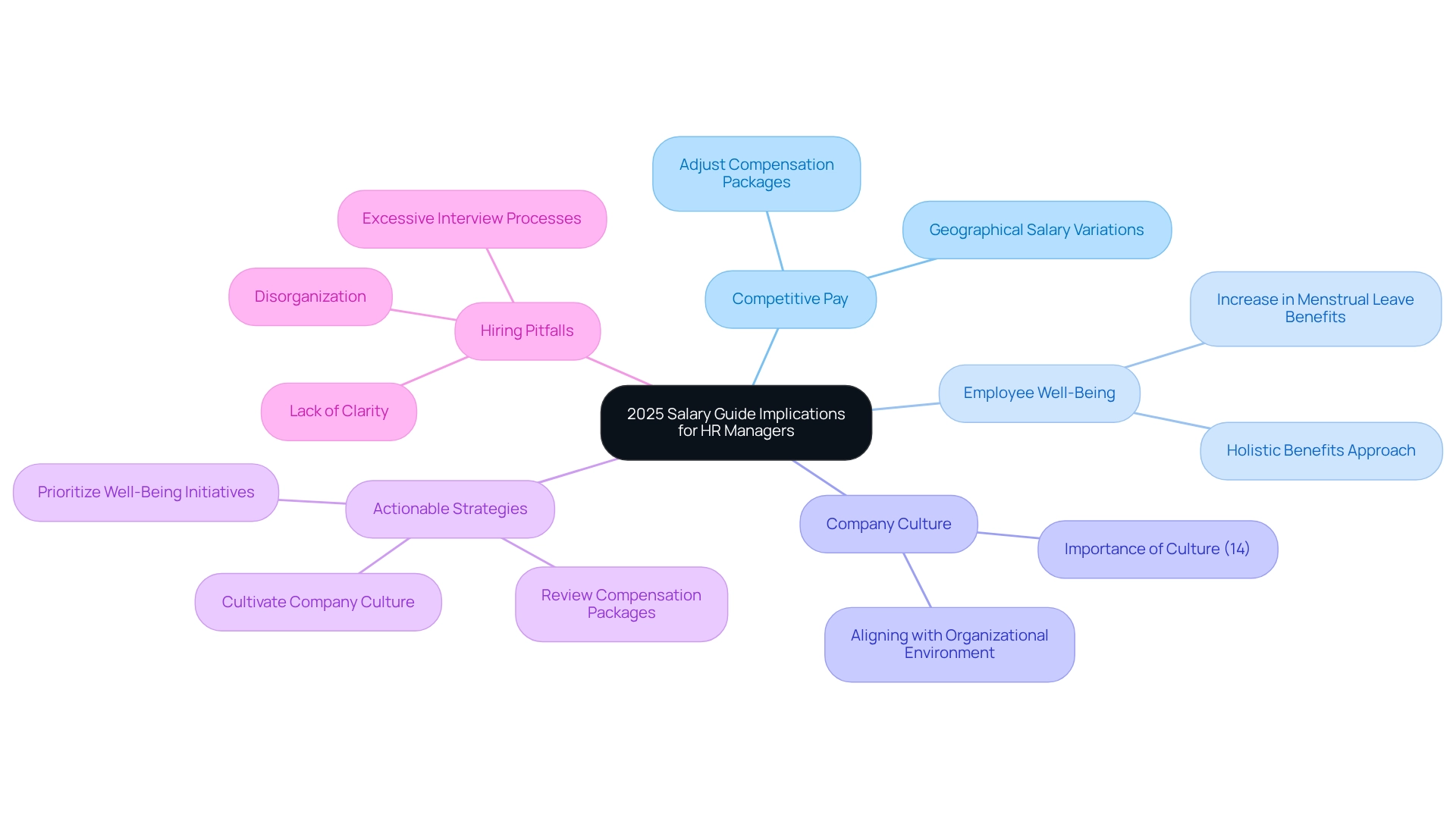
Conclusion
The insights provided by the 2025 Salary Guide are invaluable for HR managers navigating the complex landscape of recruitment and compensation. This guide underscores the critical importance of aligning salary expectations with industry standards, particularly in high-demand sectors such as technology and healthcare. With projected salaries for roles like Data Scientists and Healthcare Managers poised to soar, it is essential for organizations to stay informed about these trends to attract and retain top talent.
Moreover, the evolving job market highlights the necessity for personalized recruitment strategies that prioritize in-demand skills and employee well-being. As companies increasingly adopt flexible compensation models and performance-based pay, HR managers must adapt their approaches to foster a motivated and engaged workforce. Implementing transparent salary structures and enhancing employee benefits—especially in mental health support and flexible work arrangements—will not only improve overall job satisfaction but also strengthen employee retention.
Additionally, understanding geographical salary variations is crucial for effective recruitment. Cities with higher living costs often offer salaries that exceed national averages, necessitating a tailored approach to compensation that reflects local market conditions. By leveraging the insights from the Salary Guide, HR professionals can make informed decisions that align their compensation packages with market demands, thereby enhancing their organization’s appeal to prospective candidates.
Ultimately, the 2025 Salary Guide serves as a roadmap for HR managers aiming to navigate the intricacies of recruitment and compensation in a competitive job market. By embracing these insights and implementing strategic adjustments, organizations can cultivate a thriving workforce equipped to meet the challenges of the future.
Frequently Asked Questions
What services does Boutique Recruiting provide?
Boutique Recruiting excels in connecting high-quality candidates with employers across various industries, including finance, marketing, operations, and technology, through a personalized service model.
How does Boutique Recruiting help HR managers?
They provide essential insights into compensation expectations that align with industry standards and candidate qualifications, enabling HR managers to make informed compensation decisions.
What trends are highlighted in the 2025 salary guide?
The 2025 salary guide indicates that the recruitment landscape will increasingly focus on efficiency, transparency, and candidate experience, with 93% of companies expected to invest in recruitment technology.
What is the significance of personalized recruitment services according to the article?
Personalized recruitment services are crucial for aligning compensation expectations with market trends and fostering strong employee relationships.
What does Dr. Veldsman’s case study emphasize?
Dr. Veldsman’s case study, ‘Unlocking Individual Potential,’ emphasizes the transformative role of HR professionals in creating environments that nurture individual potential, which impacts compensation insights and organizational success.
What are the highest paying roles in 2025 according to the salary guide?
Data Scientists and Healthcare Managers are expected to have the highest earnings, with Data Scientists earning between $120,000 and $150,000.
How should HR managers approach compensation in 2025?
HR managers should align compensation offerings with the 2025 salary guide to attract and retain top talent, considering the evolving job market.
What skills are becoming more sought after in the job market?
Essential skills include data analysis, AI proficiency, and project management, which are critical for maintaining competitiveness in various industries.
What shift in hiring practices is mentioned in the article?
There is a trend where 74% of executives prioritize proven expertise over formal degrees when selecting freelancers.
How can organizations prepare for the evolving job landscape?
Organizations should utilize the 2025 salary guide to focus on candidates with strong data analysis and AI skills, aligning recruitment efforts with in-demand skills to thrive in the changing job market.